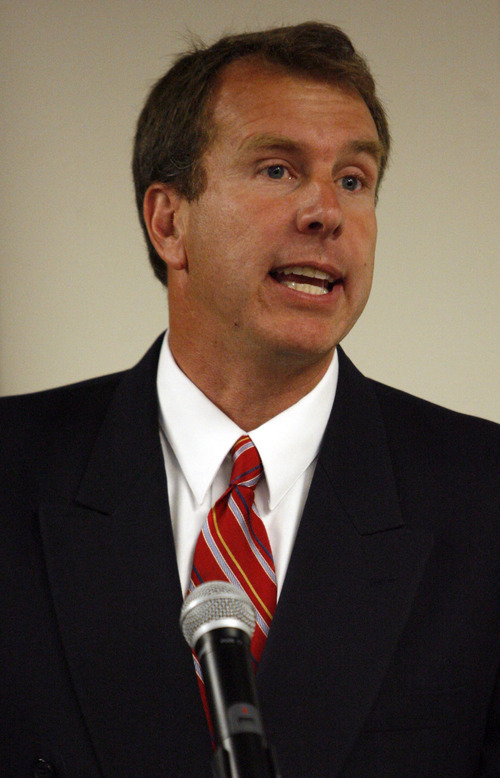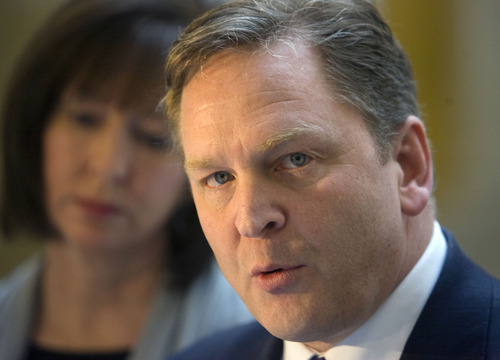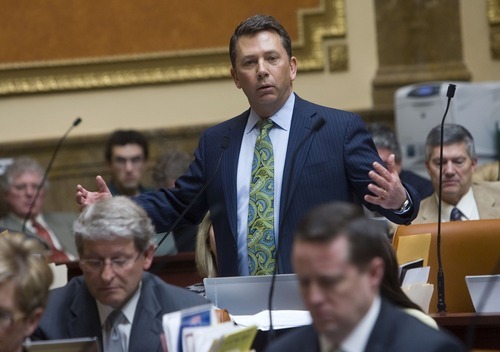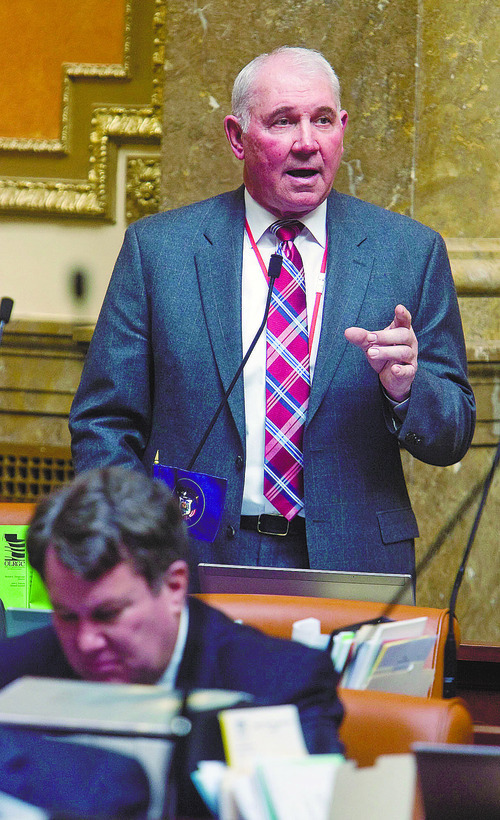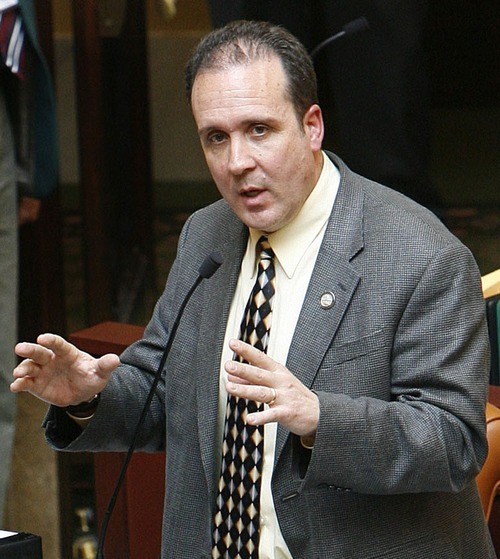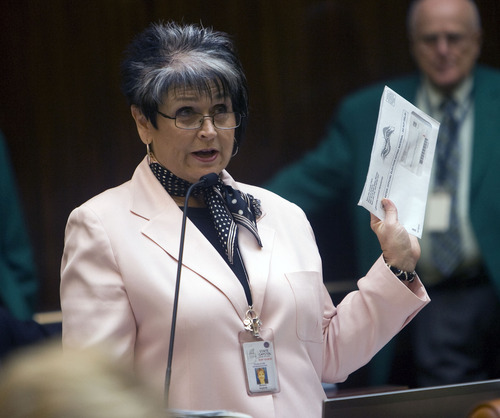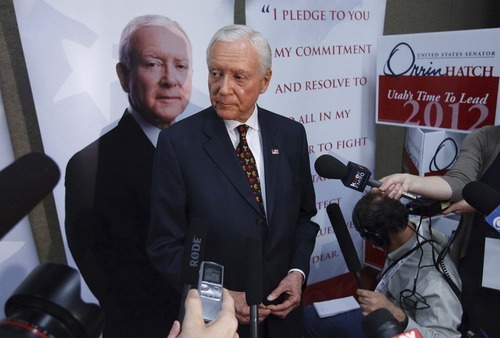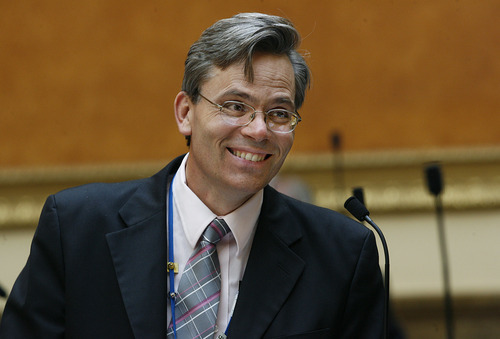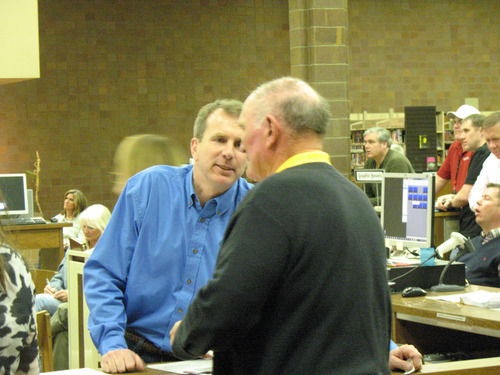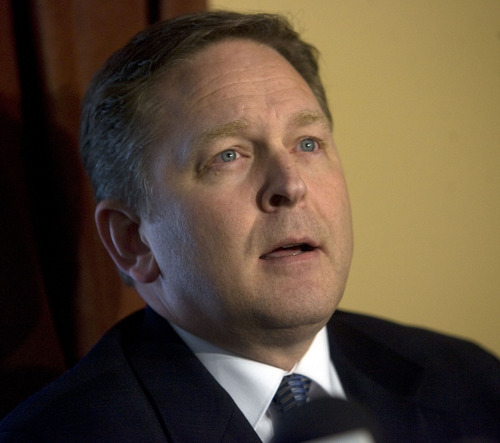This is an archived article that was published on sltrib.com in 2012, and information in the article may be outdated. It is provided only for personal research purposes and may not be reprinted.
It's a notable reversal for one of America's most right-wing states: Utah legislators who rank as the state's most conservative have this year been defeated in convention or forced into primaries far more often than their more centrist or even left-leaning colleagues.
For example, Rep. Ken Sumsion, R-American Fork, is Utah's most conservative legislator, according to new, combined rankings by special-interest groups from across the political spectrum. But he lost his race for governor, rejected by the state GOP convention.
The No. 2 most conservative member, Rep. Craig Frank, R-Pleasant Grove, lost his race for the state Senate, rejected at the Utah County Republican convention.
Among others ranked among the most conservative:
• Rep. Chris Herrod, R-Provo, lost a race for the U.S. Senate
• Former Rep. Steve Sandstrom, R-Orem, lost a race for Congress
• and Merlynn Newbold, R-South Jordan, lost reelection to the state House in the Salt Lake County GOP convention.
Conservatives have a name for what they think is happening. "It's the Orrin Hatch effect," Frank said.
To avoid being ousted by tea partyers and other conservatives at the state convention — as was Sen. Bob Bennett in 2010 — Hatch spent millions to recruit people to party caucuses who could replace the former conservative delegates. That effort was boosted by letters from the LDS Church that were read over the pulpit for weeks urging members to attend caucus meetings. Church leaders said that broader participation would make for a more representative candidate-nominating process.
Moderate surge • Those efforts doubled, and sometimes quadrupled, attendance in many areas, and helped Hatch survive the state GOP convention. But ultraconservatives say the newer, more moderate delegates have hurt them up and down the ballot.
"A lot of us talk about the Hatch effect. There's no doubt that having three to four times the people at caucuses had an effect," Herrod said. "People running for delegate used to have a three minute opportunity to say what issues are important to them. This year, we heard repeatedly that caucuses just wanted to hear who you are going to vote for president, and who you are going to vote for Senate."
Frank said what happened this year resulted in a dramatic change.
"I had been working with my delegates for nearly 10 years," he said. "But only a small percentage of them was reelected. They were effectively replaced by what I would consider less conservative, more moderate participants."
On top of that, many of the most conservative legislators were attempting to run for higher office. Frank notes that is always a gamble with advantages that incumbents have — and that, combined with the new crop of more moderate delegates, often doomed them.
Sumsion says conservatives were clearly put at a disadvantage by the influx of moderate delegates.
"Senator Hatch was very successful in electing a new crop of delegates from people who had not been active in politics before. They certainly were more moderate. It hurt other conservatives."
Numbers help show just how deeply it has hurt that side of the political spectrum.
Scorecard • In order to get at those numbers, The Salt Lake Tribune combined scorecards of six special-interest groups from across the political spectrum that ranked 2012 legislators on votes they considered important. Two groups are liberal: the Sierra Club and the Utah Education Association. Four are conservative: GrassRoots, Parents for Choice in Education, the Sutherland Institute and the Utah Taxpayers Association.
The groups generally agree about who is conservative and who is liberal. Their scores were combined and averaged on a scale from 0 to 100, where the higher the score means the more conservative a member is. A score of 50 would put a member in the political center. A list of scores for all legislators is online at http://bit.ly/La4rl5.
Among the most conservative legislators seeking any office — those who received a score of 75 or higher this year — 16 percent were defeated in convention and 22 percent were forced into primaries.
In comparison, not one of the right-leaning moderates — who had scores between 50 and 74 — was defeated at convention and only 11.4 percent of them were forced into primaries, or less than half the rate of those who are more conservative.
Only one of the 80 Republican legislators — Rep. Kraig Powell, R-Heber City — had a score that was slightly left of center, a 47. He secured his party's nomination for the general election without any challenge. None of the 24 Democrats in the Legislature had scores right of center — and two of them lost elections in their conventions. Only one Democrat —the body's most conservative one, Rep. Neal Hendrickson, D-West Valley — was forced into a primary.
Many ultra-conservative Republicans who survived their conventions were still forced into primaries — sometimes for the first time in years.
They include Rep. Bill Wright, R-Holden, author of a controversial, eventually vetoed bill to allow schools to drop sex education classes — and prohibit instruction in the use of contraception in those that keep such classes; Rep. Brad Daw, R-Orem; and Rep. David Butterfield, R-Logan.
Pendulum swings • "It shows the political pendulum is starting to swing back" from the far-right in Utah, said Kelly Patterson, director of Brigham Young University's Center for the Study of Elections and Democracy. "It had swung about as far to the conservative side as it could. It was a question of how long it could stay there."
Ultraconservatives forced into primaries might even have more bad news ahead of them, said Patterson.
Voters in Utah GOP primary elections tend to be less conservative than convention delegates — even given this year's infusion of more moderate delegates, he noted. So those who failed to win their nomination at the convention could face a tough time in runoff elections.
But ultraconservatives are not willing to concede that they are in decline. They see the "Hatch effect" as a temporary setback.
"I don't believe it will happen again in two years," Frank said. "We won't have the need to protect our senior statesmen, our political patriarchs in the next go-around."
Herrod added that he believes people who are more moderate usurped issues of ultraconservatives this year, so everyone was running on the same issues — but that may not happen in the future.
"We were talking about states' rights, federal land issues, the deficit and Obamacare for the last four years. They are some of the things that made us more conservative, yet everyone seemed to run on those," he said.
The combined scorecards of the special interest groups this year gave the Legislature a combined score of 65 percent, well right of center — but less so than previous years. A similar ranking last year (before the Sutherland Institute began issuing such scorecards and was included in the Tribune's calculations) yielded an overall score of 73. And in 2010, it came in at 67.
This year's average for all Republicans was 74 percent, and the average for Democrats, 33 percent — meaning interest groups view Utah Republican lawmakers as leaning further to the right than Utah Democrats lean to the left.
The scorecard gave the Senate an average score of 66 percent, and the House a score of 64 percent. The numbers • Republican scorecard
Republicans legislators who are considered the most conservative have lost 16 percent of races this year in convention, and 22 percent have been forced into primaries.
More moderate Republicans did not lose any races in convention and only 11 percent were forced into primaries. —
Online • 2012 Legislature rated
O See a chart at http://bit.ly/La4rl5


